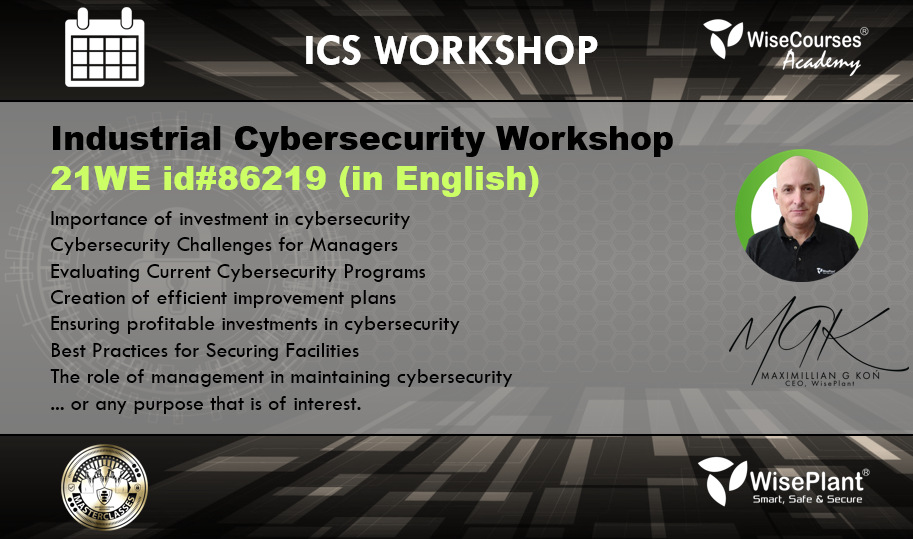
21WE – Industrial Cybersecurity Workshop (in English)

I have seen the devastating consequences of not taking industrial cybersecurity seriously. It’s easy to think “that’s not going to happen to me”, but the truth is that it can happen to anyone. That’s why I highly recommend attending an industrial cybersecurity workshop to learn the essential tips and tricks for staying safe and secure in the digital world. The industrial cybersecurity workshop is all about that and gives you some expert tips to keep the plant out of cyber risk. These tips could be the difference between being a victim of a cyber incident and being protected against it.
What is a Cybersecurity Workshop?
A cybersecurity workshop is a training program designed to help managers on how to effectively manage their cybersecurity investments and protect their facilities from potential risks.
These workshops focus on addressing the specific challenges managers face in ensuring the safety and security of their facilities. The goal is to equip participants with the necessary skills to evaluate cybersecurity programs and create cost-effective improvement plans.
A workshop can be scheduled with a fixed agenda of topics to be discussed, or participants are free to ask questions of the instructor or the SME (Subject Matter Expert). The SME will respond to participants based on their best knowledge and experience.
These cybersecurity workshops are becoming increasingly important in today’s digital age, as weaknesses in security can have serious consequences for industrial plants.
These workshops are specifically designed for managers responsible for ensuring the safety of their facilities. They help managers understand the importance of cybersecurity investment, identify specific cybersecurity challenges, evaluate current cybersecurity programs, create efficient improvement plans, ensure cost-effective cybersecurity investments, and implement best practices to protect their facilities.
Features of this event ID#86219
- Language: English
- Duration: 4 hours, 8 hours, or 16 hours.
- When: Any days after your purchase, to be schedulled.
- Modality: online virtual as needed. (request a quote for face-to-face option).
- Closed for companies with a maximum of 6 participants. (consult for more quantity).
- Complementary material according to the topics covered.
- We created a private forum for support and experience on the topics developed after the event.
We recommend the workshop with a duration of 8 or 16 hours for a first session and the workshops of 4 hours to expand on a particular.
Our Credentials:
- Co-Authors and Certified Instructors of official ISA/IEC-62443 courses. Courses IC32, IC33, IC34, and IC37.
- Members of the ISA99 Committee since 2006.
- Active members of ISA Secure.
- Founding members of the ISA Global Cybersecurity Alliance.
- Extensive experience in implementing the ISA/IEC-62443 series of standards.
- Extensive experience in instrumentation, automation, safety instrumented systems, HMI/SCADA, etc.
- Extensive experience in all industries. Energy, oil, gas, steel, food, pharma, mining, etc.
Here are some of the benefits of attending a cybersecurity workshop:
Increased knowledge and awareness: Participants will learn about the latest approaches to cybersecurity and how to identify potential risks in their facilities. They will also gain a better understanding of international standards and compliance requirements related to cybersecurity.
Enhanced risk management: By attending a workshop on cybersecurity, managers will learn how to develop a risk management strategy that is tailored to their organization’s specific needs. This approach will help them identify potential risks and manage them effectively.
Better incident response: A crucial aspect of cybersecurity is being able to respond quickly to security incidents. Participants in cybersecurity workshops will learn how to create an incident response plan that can help minimize damage and prevent future incidents.
Cost-effective solutions: A workshop on cybersecurity will teach participants how to create a robust and cost-effective cybersecurity program. They will learn how to identify the most critical areas that need improvement and prioritize their investments accordingly.
Avoid making the typical mistakes that almost all organizations make, due to lack of experience and genuine advice from experts who are well versed in standards and highly regulated and managed industry environments.
In summary, attending a cybersecurity workshop can help managers improve their knowledge and skills when it comes to managing cybersecurity investments. They will learn how to evaluate cybersecurity programs, identify potential risks and vulnerabilities, and develop cost-effective improvement plans. By being proactive and investing in their cybersecurity infrastructure, organizations can prevent costly security breaches and protect their reputation.
Practical tips for organizing the Workshop:
- Define the purpose: Before starting a cybersecurity workshop, it is important to define the purpose of the workshop. Decide on the topic you want to discuss, the audience you want to target, and what skills or knowledge you want participants to acquire.
- Use an interactive approach: A cybersecurity workshop should be interactive or hands-on. Encourage participants to ask questions, participate in discussions, and conduct activities that help them understand the importance of cybersecurity.
- Create a safe learning environment: Participants should feel comfortable and safe during the cybersecurity workshop. Ensure that there are clear guidelines on what is expected of the workshop and foster an environment that encourages active participation and learning.
- Monitoring and evaluation: After the cybersecurity workshop, follow up with participants to get feedback on what they learned and how they plan to apply that knowledge.
- Feedback can help create future workshops, ensure participants gain the skills and knowledge they need, and provide a tool to measure the effectiveness of your cybersecurity workshop. Answer questions and questions that no one answers.
Below are the suggested topics that could be developed. Or any other specific topics suggested by the participants.
Understanding the Importance of Cybersecurity Investment
Investing in cybersecurity is not only critical to protecting critical assets, but also to maintaining the integrity of a company’s reputation and operational continuity. Investing in cybersecurity ensures that plants are prepared to deal with potential risks and that they can mitigate risks associated with potential cyber incidents or threats. In addition, a strong cybersecurity strategy can help organizations comply with regulatory obligations, protect intellectual property, prevent financial loss and physical damage.
Key points:
- Investing in cybersecurity is critical to protecting critical assets and maintaining a company’s reputation.
- Investing in cybersecurity helps businesses counter potential threats and mitigate the risks associated with cyberattacks.
- Strong cybersecurity strategies help organizations meet regulatory obligations, protect intellectual property, and prevent financial loss.
Identifying specific cybersecurity challenges for managers
WisePlant’s cybersecurity workshops help managers identify specific cybersecurity challenges they may face when protecting their facilities. These challenges can range from a lack of awareness of cybersecurity threats to insufficient training and education for employees. Cybersecurity threats can also arise due to unmitigated risk or a lack of effective security policies. The workshops are designed to help managers understand the specific industrial cybersecurity challenges they face and provide them with the knowledge and tools to address these challenges.
Key points:
- Cybersecurity challenges can arise from a lack of awareness of cybersecurity risks, insufficient employee training and education, weakness in OT infrastructure design, and lack of effective security policies.
- WisePlant’s cybersecurity workshops help managers identify the specific cybersecurity challenges they face.
- The workshops equip managers with knowledge and tools.
Evaluation of current cybersecurity programs
Once managers have identified the specific industrial cybersecurity challenges in their facilities, they should evaluate their current programs to measure their effectiveness in addressing these challenges. WisePlant’s cybersecurity workshops include training on how to evaluate cybersecurity programs using established frameworks and methodologies. This training helps managers identify gaps in their cybersecurity programs and make recommendations to improve them.
Key points:
- Managers should evaluate their current cybersecurity programs to measure their effectiveness in addressing specific cybersecurity challenges.
- WisePlant’s cybersecurity workshops include training on how to evaluate cybersecurity programs using established frameworks and methodologies.
- The training helps managers identify gaps in their cybersecurity programs and make recommendations to improve them.
Creation of efficient improvement plans
After evaluating the effectiveness of their current cybersecurity programs, managers should create efficient improvement plans that address the identified deficiencies. WisePlant’s cybersecurity workshops provide training on how to create cost-effective improvement plans that prioritize the most critical cybersecurity issues. These improvement plans must be achievable, measurable, and aligned with the company’s business objectives.
Key points:
- Managers need to create efficient improvement plans that address the gaps identified in their cybersecurity programs.
- WisePlant’s cybersecurity workshops provide training on how to create cost-effective improvement plans that prioritize the most critical cybersecurity issues.
- Improvement plans should be achievable, measurable, and aligned with the company’s business goals.
How to ensure profitable investments in cybersecurity
Cost-effectiveness is an important factor to consider when investing in cybersecurity. WisePlant’s cybersecurity workshops offer training on how to ensure that cybersecurity investments are cost-effective. This includes identifying the right tools and technologies that deliver the most value, using established cybersecurity practices and standards, and considering the long-term impact of cybersecurity investments.
Key points:
- Cost-effectiveness is an important consideration when investing in cybersecurity.
- WisePlant’s cybersecurity workshops provide training on how to ensure cybersecurity investments are cost-effective.
- Managers need to consider the long-term impact of cybersecurity investments.
Best Practices for Securing Facilities
WisePlant’s cybersecurity workshops also offer training on best practices for securing facilities. These include implementing multi-layered security measures, such as firewalls, antivirus software, and intrusion detection systems, as well as creating strong passwords and network access controls. Regular system and software updates, employee training, and customer education on cyber threats are also important components of a comprehensive cybersecurity strategy.
Key points:
- Multi-layered security measures, strong passwords, and network access controls are best practices for securing facilities.
- Regular system and software updates, employee training, and customer education on cyber threats are also important components of a comprehensive cybersecurity strategy.
- WisePlant’s cybersecurity workshops provide training on best practices for securing facilities.
The role of management in maintaining cybersecurity
The role of management in maintaining cybersecurity cannot be overstated. It is the responsibility of managers to ensure that their facilities are adequately protected against cyber risks. This includes implementing, maintaining, and updating cybersecurity programs, as well as promoting a culture of cybersecurity awareness and responsibility among employees. Managers should also regularly evaluate the effectiveness of cybersecurity investments and make the necessary changes to ensure the continued effectiveness of their cybersecurity programs.
Key points:
- Managers are responsible for ensuring that their facilities are adequately protected against cyber threats.
- Managers should promote a culture of cybersecurity awareness and responsibility among employees.
- The effectiveness of cybersecurity investments should be evaluated regularly.
In conclusion, WisePlant’s cybersecurity workshops provide valuable training and resources that help managers address specific cybersecurity challenges, evaluate the effectiveness of their cybersecurity programs, and create cost-effective improvement plans. These workshops are essential for businesses that want to protect their sensitive information, maintain the integrity of their reputation, and comply with regulatory obligations. The workshops also provide training on best practices for securing facilities and promote a culture of cybersecurity awareness and responsibility among employees.


